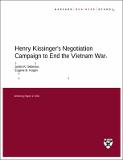| dc.contributor.author | Sebenius, James Kimble | |
| dc.contributor.author | Kogan, Eugene B | |
| dc.date.accessioned | 2017-01-20T14:04:06Z | |
| dc.date.issued | 2017-01-20 | |
| dc.identifier.citation | Sebenius, James K., and Eugene B. Kogan. "Henry Kissinger's Negotiation Campaign to End the Vietnam War." Harvard Business School Working Paper, No. 17-053, December 2016. | en_US |
| dc.identifier.uri | http://nrs.harvard.edu/urn-3:HUL.InstRepos:30011595 | |
| dc.description.abstract | President Richard M. Nixon was elected in 1968 with the widespread expectation that he would bring about an end to the costly and unpopular war in Vietnam. The task largely fell to National Security Adviser Henry Kissinger. When the negotiations began, North Vietnam appeared to have a winning hand with time on its side. To induce agreement from North Vietnam on acceptable terms, Kissinger orchestrated a complex negotiation campaign with multiple fronts: North Vietnam, the U.S. public and Congress China, the USSR, West Germany, and South Vietnam. Kissinger’s efforts culminated in the signing of the 1973 Paris Peace Accords, which held for about two years before collapsing in the wake of Watergate. The account in this working paper carefully describes—but does not analyze nor draw lessons from —core features of these challenging negotiations. Forthcoming papers will provide analysis and derive general insights from this negotiation campaign. | en_US |
| dc.language.iso | en_US | en_US |
| dash.license | OAP | |
| dc.title | Henry Kissinger's Negotiation Campaign to End the Vietnam War | en_US |
| dc.type | Research Paper or Report | en_US |
| dc.description.version | Author's Original | en_US |
| dc.relation.journal | Harvard Business School working paper series # 17-053 | en_US |
| dash.depositing.author | Sebenius, James Kimble | |
| dc.date.available | 2017-01-20T14:04:06Z | |
| dash.contributor.affiliated | Kogan, Eugene | |
| dash.contributor.affiliated | Sebenius, James | |


